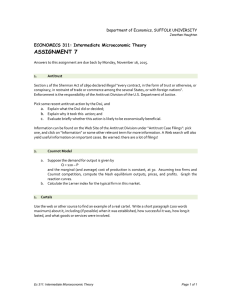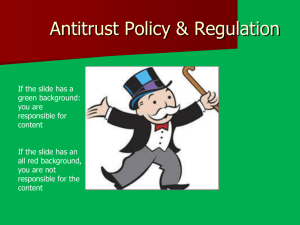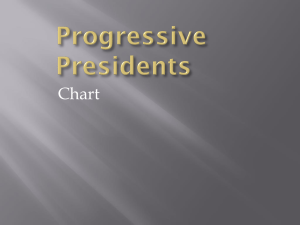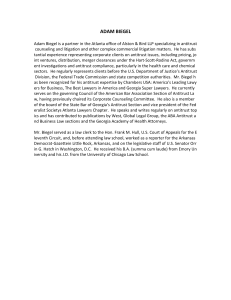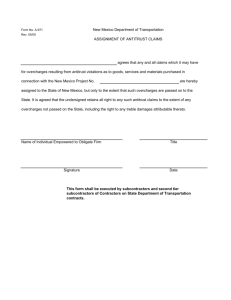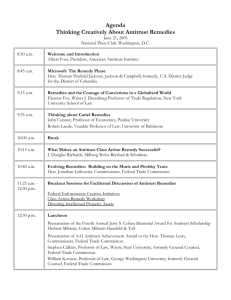UNCTAD Research Partnership Platform Geneva 7 July 2013
advertisement
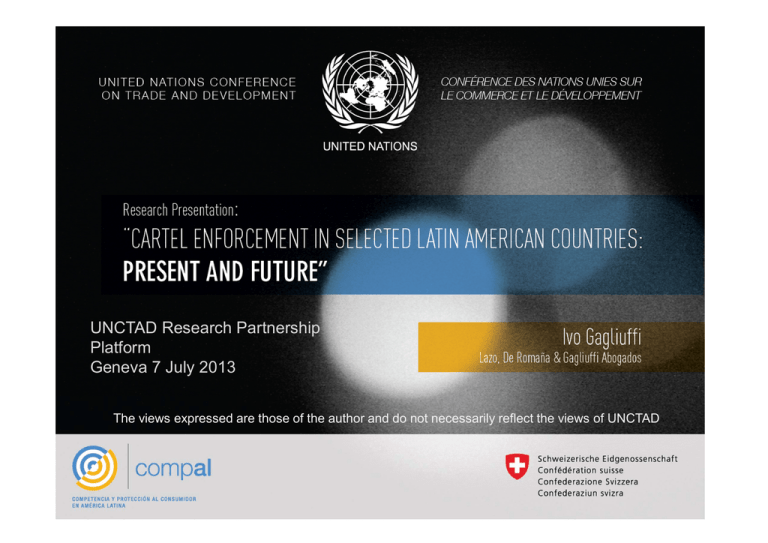
UNCTAD Research Partnership Platform Geneva 7 July 2013 The views expressed are those of the author and do not necessarily reflect the views of UNCTAD INDEX I Premises. II Perspectives from specialists in each of the selected countries. III Conclusions. 1. Basis for selection: COMPAL beneficiary countries and Mexico specifically, which was selected in order to share its particular expertise. 2. First purpose: Comparison of antitrust legislation and policies within the selected countries, in ten main areas: (i) Legislation; (ii) Competent authority; (iii) Exemption; (iv) Sanctions; (v) Proceeding; (vi) Ex officio causes; (vii) Powers of the Agency; (viii) Antitrust and Competition Advocacy; (ix) International Cooperation; and, (x) Principal antitrust cases. 3. Second purpose: Identification of the specialists´ perspectives on how to improve antitrust legislations and policies among the countries, in order to enhance the anticartel fight and to shape the future challenges on this matter. Specialist Paper Pablo Aramayo Antitrust Law and Competition in Bolivia Regulations (Year) Supreme Decree 29519 (2008) / Ministers Resolution 190 (2008) / Constitution of Bolivia (2009) Competition Agency Superintendency of Enterprises Perspectives Substantive: The antimonopoly and antioligopoly framework, approved by the Ministry of Productive Development and Plural Economy, is worrying as it allows certain exemptions from the antitrust legislation. For example, public enterprises are exempt from antitrust rules “based on efficiency criteria”, which may affect private agents. Nonetheless, such framework is not a law, but a supply to create antitrust regulations. Procedural: Regarding the fee system, on one hand, it is fundamental to determine on a legal status what “medium gravity” violations are, in order to avoid / reduce discretional nature of sanctions. On the other hand, appeals should not be tied to the payment of the fee. As for preliminary investigations, a wide period for the competition Agency to gather evidence of an antitrust conduct should be established, since the actual period is interpreted to last no more than 6 months. Specialist Paper Emilio Archila Cartel Enforcement in Colombia Regulations (Year) Law 155 (1959) / Constitution of Colombia (1991) Decree-Law 2153 (1992) Law 1340 (2009) Competition Agency Superintendency of Industry and Commerce (SIC) Perspectives Substantive: SIC should have the faculty to grant compensations for the persons affected or harmed by the anticompetitive conducts, since the Judiciary lacks from an efficient behavior when dealing with this matter. Political: SIC´s budget should be enhanced in order to make more market monitoring for detecting and even preventing cartel formation / Likewise, tools for international cooperation within competition agencies should be implemented. Such tools must be able to exchange information and collaborate in the detection and sanctioning of cartel activity. Specialist Paper Fausto Alvarado / Álvaro Polit Antitrust Law and Competition in Ecuador Regulations (Year) Constitution of Ecuador (2008) / Organic Law on Regulation and Control of Market Power (2011) / and its Regulations (2012) Competition Agency Superintendency of Market Power Control (SMPC) Perspectives Substantive: SMPC must involve in an important intern process to train and qualify its workers. Support of the competition agencies within the region, as well as from international organizations, such as UNCTAD, which has great experience on antitrust and competition law, is essential. Political: International relations within the regional competition authorities should be strengthened, in order to enforce the fight against cross-border cartels and those which are similarly copied in several countries of the region. In that sense, it is necessary to count with a protocol for cooperation and information management, and to realize that confidentiality is not an obstacle, as confidentiality agreements could be subscribed. Specialist Paper Gabriel Muadi Antitrust Law and Competition in Guatemala Regulations (Year) Penal Code (1973) / Constitution of Guatemala(1985) Competition Agency Direction of Competition (DC) of the Ministry of Economy / Public Ministry (Office of the District Attorney ) Perspectives Substantive: DC should strengthen its duties regarding competition advocacy. DC should not only inform about the benefits of a competitive market in favor of the consumers, but also change the “national culture” on how the participation in such market by pointing out the setbacks caused by price fixing and market distribution. Competition should be taught in all careers, so that future executives and managers are aware of its importance. Political: The government, in coordination with the private sector, should implement a Competition Policy in order to pass a Competition Law and to enforce DC´s faculties / Furthermore, the government should coordinate with other central American countries the actions aiming to prosecute regional dimension cartels, throughout the harmonization of its antitrust and competition rules and the creation of a supranational authority. Specialist Paper Leonidas Rosa Antitrust Law and Competition in Honduras Regulations (Year) Constitution of Honduras (1982) / Supreme Decree 234-2005, Law for the Defense and Promotion of Competition (2005) / Agreement 001-2007, Regulations (2007) Competition Agency Commission for the Defense and Promotion of Competition (CDPC) Perspectives Substantive: The Law for the Defense and Promotion of Competition is not fully suitable for the economic context of Honduras. Said Law presupposes a well developed market economy, which allows to sanction professional associations (bars), labor union and syndicates, despite the fact that these organizations have a fundamental role in the society. Political: For an adequate implementation of antitrust rules, it is necessary to develop other institutions because the CDPC is not capable of such implementation on its own. Thus, the Consumer´s Office (Public Ministry) and the National Police, among others, should be involved, considering the economic nature (economic crimes) of the laws and regulations that these entities deal with. Specialist Paper Fernando Carreño Antitrust Law and Competition in Mexico Regulations (Year) Constitution of Mexico (1917) / Federal Law on Economic Competition (1992) / Regulations (2007) Competition Agency Federal Competition Commission (FCC) Perspectives Substantive: Mexico is empowering FCC with more resources to increase ex-officio investigations in markets with high level of concentration. Likewise, FCC has passed new intern regulations and is working on new Regulations for the Federal Law on Economic Competition. Political: As international trade is growing and the economic crisis is starting to be overcome in Mexico, it will be necessary to reinforce international cooperation, to guarantee a healthy and solid market in benefit of the consumers. Specialist Paper Darliss Gordon Antitrust Law and Competition in Nicaragua Regulations (Year) Law 601, Law to Promote Competition (2006) / Decree 79-2006, Regulations (2007) Competition Agency National Institute for the Promotion of Competition (PROCOMPETENCIA). Perspectives Substantive: PROCOMPETENCIA must have a more proactive role with the competition advocacy, and manage to spread a “competition culture” among the population, where the knowledge of Competition and Antitrust Law is limited to entrepreneurs, lawyers and law schools. Political: The Competition Policy to be implemented should allow PROCOMPETENCIA to identify any anticompetitive conduct, along with the supervising authority of a determined sector. Otherwise, companies under regulated markets may be able to evade the application of antitrust rules / Furthermore, the government should strengthen its cooperation bonds and efforts with other competition agencies in order to detect and prosecute international cartels. Specialist Paper Ivo Gagliuffi Antitrust Law and Competition in Peru Regulations (Year) Constitution of Peru (1993) / Legislative Decree 1034, Law for the Repression of Anticompetitive Practices) (2008) Competition Agency National Institute for the Defense of Competition and Intellectual Property Protection (INDECOPI) Perspectives Substantive: The concept “offenders” should comprise not only private companies and their officials, but also government agencies and public officials. In Peru, anti-competitive practices have been promoted or required by the government itself; however, their officials have been exempted under the premise that their conducts are not "economic acts", but only "political acts". This is unfair and discriminatory. Procedural: INDECOPI should resolve antitrust cases within the statutory deadlines, regardless of the complexity or extension of the dispute, since the alleged conduct could be causing harm to the market in general. Political: INDECOPI should be more proactive in promoting ex-officio procedures, although this will also depend on a budget increase.bonds and efforts with other competition agencies in order to detect and prosecute international cartels. Specialist Paper Elka Scheker Overview of Competition and Antitrust Law in Dominican Republic Regulations (Year) Law 42-08, Competition Defense Law (2008) Competition Agency National Commission on Competition Defense (NCCD) Perspectives Substantive: NCCD should strengthen its competition advocacy, by spreading antitrust legislation to sectors other than ,professionals and similar entities in the region / Also, it is important to notice that proposed Regulations for the Competition Defense Law focuses more on the elimination of bureaucratic barriers than on cartel prevention and education of economic agents on antitrust legislation, which is not convenient. Political: It is alarming that after 5 years of the approval of the Competition Defense Law, its implementation has not been possible. Despite the Directive Council of the NCCD has been installed, the Executive Director (who is in charge of instructing the procedures) has not been designed so far. Specialist Paper Juan Manuel Mercant Antitrust Law and Competition in Uruguay Regulations (Year) Constitution of Uruguay (1967) / Law 18159, Law of Promotion and Defense of Competition (2007) / Reglamentary Decree 404/007 (2007) Competition Agency Commission of Defense of Competition (CDC) Perspectives Substantive: CPDC should carry out more Competition Advocacy in order to expand the knowledge and benefits generated by competition policies. Also, CDC should initiate ex-officio investigations against public companies, in order to show a universal application of the regulations. Procedural: CDC should be more rigorous in order to reject allegations that are notoriously inadmissible. Also, CDC should not admit new evidence at any stage because it affects the normal development of the procedure. Political: CDC should receive greater financial and human resources to ensure the independence and performance related to its functions of monitoring the markets and increasing the ex-officio investigations. Thus, it should not only depend on private complaints. 1) In regards to a regulation comparison, the selected countries have antitrust laws that share the same structure and legal figures in a broad sense, however there are significant differences at the level of experience and case studies, as a result of the implementation dates of their national legislation and the start of the operation of the Competition Agencies. This gap will only be reduced over time through exchanges with other more experienced agencies, as well as the knowledge and the resolution of more antitrust disputes. 2) In regards to a substantive perspective, experts agree that most Competition Agencies should strengthen their Competition Advocacy work and change the "market culture", which implies a greater dissemination of antitrust law to the public through courses and workshops, but also by using mass media, as well as providing information of emblematic cases in order to understand their nature and scope. 3) In regards to a procedural perspective, experts call attention to the need of Competition Agencies that are more stringent to admit clearly inadmissible complaints, but in turn are requested to initiate more Ex-Officio cases especially in concentrated markets. Experts also suggest that the Competition Agencies should solve cases within the statutory deadlines because their rulings have been delayed too long; although experts have admitted that the latter depends on having sufficient financial resources. 4) In regards to a political perspective, experts mostly agree that the Governments should encourage the conclusion of cooperation agreements between Competition Agencies, mainly with regional peers, in order to investigate cross-border or international cartels, as well as cases that replicate similarly in several countries within the same region. This would imply a development of a second phase for an extended jurisdiction, much more complex and sophisticated.
